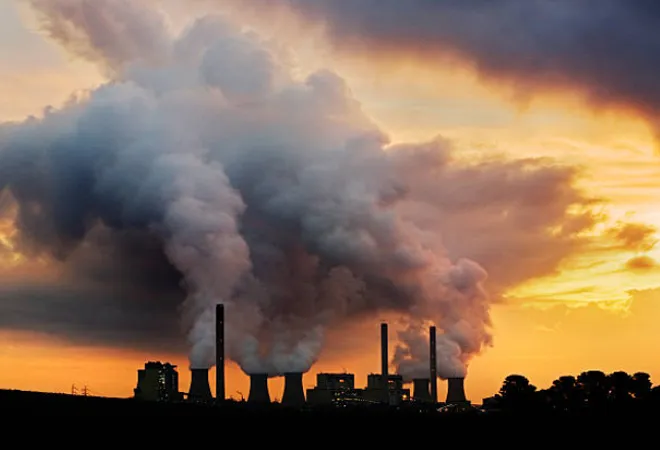-
CENTRES
Progammes & Centres
Location
The challenge of a “net zero” for India is not an easy one. Being one of the fastest growing economies with the second largest population that aspires to be $5 trillion economy soon, will India be able to circumvent the trade-off between the environment and economic growth?

Occidental academics and policy makers, especially in the Nordic nations acknowledge that the attempts to nurture current levels of growth are proving to be costly due to climate change, and degradation and depletion of the natural ecosystem.Does the solution lie with decoupling economic growth and CO2 emissions, as has often been hypothesised? There is no denying of the developed and developing world’s contribution to the process of degradation of the ambient environment because of its inherent “growth fetishism”. Planetary boundaries which needed to be adhered to for humanity to continue to live and thrive into the future, are under tremendous stress and some of them including climate change have already been breached. Given these violations, growth can be “green” only if absolute decoupling occurs between growth and carbon emissions. Therefore, the notion of “green growth” started being accepted as the solution to the problem. We argue here that such decoupling of growth from environmental degradation is practically and axiomatically impossible. In a 2016 paper, Ward et al on the basis of an analytical macro-model, infer, “ growth in GDP ultimately cannot plausibly be decoupled from growth in material and energy use, demonstrating categorically that GDP growth cannot be sustained indefinitely. It is therefore misleading to develop a growth-oriented policy around the expectation that decoupling is possible”. This has its implications for CO2 emissions, as the loss of forests, agro-ecosystems, or wetlands in pursuit of economic growth is prone to destroy the sink mechanisms for carbon. Therefore, “green growth” is an oxymoron. Growth is necessarily “brown” in colour, with its concomitant costs, On the other hand, the degrowth school, while contesting the green growth hypothesis on the above ground, proposes a retraction from the present ways of living through contraction of economic activities in the global north. It is further believed that this will create the space for a more self-delineated trajectory of social organisation in the global south. Contrary to popular thinking that degrowth is a fashionable statement for those parts of the world that have already grown (i.e. the global north), it is actually a statement emanating from a world that is more equitable, where social security is strong enough to act as a cushion during a crisis, where policies have been effected on distributive justice, and where reliance on market forces for meeting social needs is less.
The concern of India and the underdeveloped world of the developing nations cannot be looked at through the lens of “net zero” that has emerged mostly as an occidental construct for the global north.Therefore, the occident can aspire to have a “net zero” ambition as the sole objective in a climate negotiation table, as their equity concerns are largely met. This makes EU think of the European Green Deal to become the world's first “climate-neutral bloc” by 2050.
The views expressed above belong to the author(s). ORF research and analyses now available on Telegram! Click here to access our curated content — blogs, longforms and interviews.

Dr Nilanjan Ghosh is Vice President – Development Studies at the Observer Research Foundation (ORF) in India, and is also in charge of the Foundation’s ...
Read More +
Renita DSouza is a PhD in Economics and was a Fellow at Observer Research Foundation Mumbai under the Inclusive Growth and SDGs programme. Her research ...
Read More +